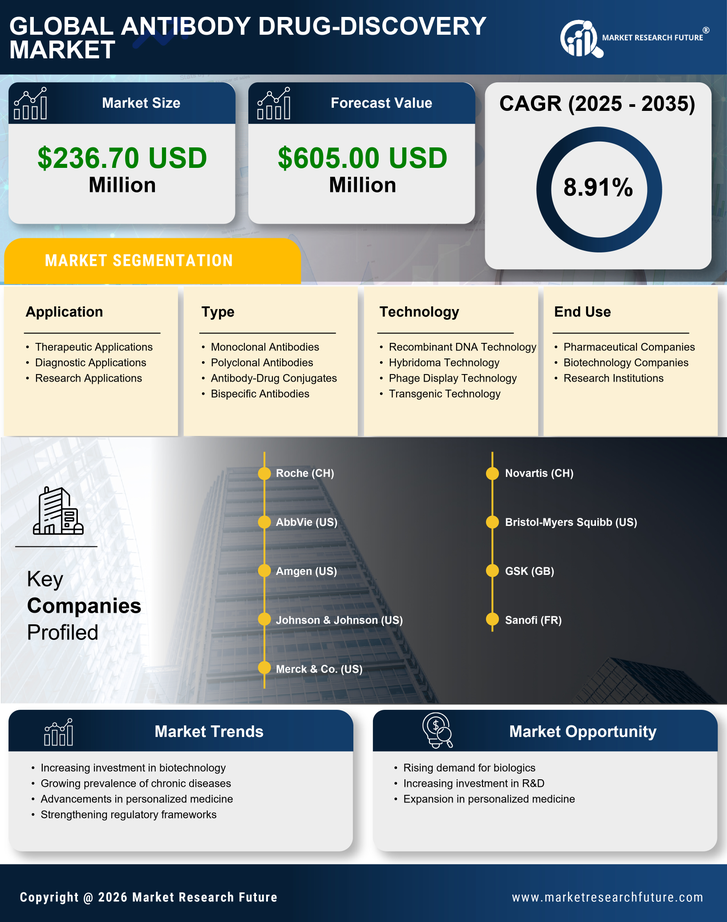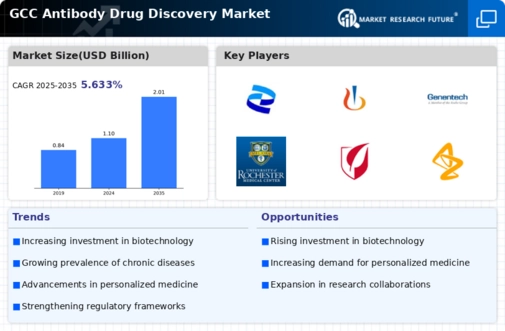Growing Demand for Biologics
The rising demand for biologics is significantly influencing the antibody drug-discovery market. Biologics, including monoclonal antibodies, are increasingly recognized for their efficacy in treating various diseases, particularly in oncology and immunology. In the GCC, there is a notable shift towards biologic therapies as healthcare providers seek more effective treatment options. This trend is supported by a growing body of clinical evidence demonstrating the benefits of biologics over traditional therapies. As patient awareness and acceptance of biologic treatments increase, the market for antibody drug-discovery is expected to expand. The potential for biologics to address unmet medical needs positions the antibody drug-discovery market favorably for future growth.
Collaborations and Partnerships
Strategic collaborations between pharmaceutical companies, research institutions, and universities are emerging as a significant driver in the antibody drug-discovery market. These partnerships facilitate knowledge exchange and resource sharing, accelerating the development of innovative antibody therapies. In the GCC, several collaborations have been established to leverage local expertise and global advancements in biotechnology. Such alliances not only enhance research capabilities but also provide access to funding and advanced technologies. The synergy created through these partnerships is likely to lead to the discovery of novel antibodies, thereby expanding the market. As companies seek to enhance their competitive edge, the trend of collaboration is expected to continue shaping the landscape of the antibody drug-discovery market.
Government Initiatives and Funding
Government support plays a crucial role in the growth of the antibody drug-discovery market in the GCC. Various initiatives aimed at enhancing healthcare infrastructure and promoting research and development are being implemented. For instance, funding programs and grants are being allocated to support biotechnology and pharmaceutical research. This financial backing is essential for fostering innovation in antibody drug-discovery, enabling companies to advance their research capabilities. The GCC governments are increasingly recognizing the importance of biotechnology in diversifying their economies, which further stimulates the market. As a result, the antibody drug-discovery market is likely to benefit from enhanced funding and resources, facilitating the development of new therapeutic antibodies.
Rising Prevalence of Chronic Diseases
The increasing incidence of chronic diseases in the GCC region is a primary driver for the antibody drug-discovery market. Conditions such as cancer, diabetes, and autoimmune disorders are becoming more prevalent, necessitating innovative therapeutic solutions. According to recent health statistics, the GCC countries have witnessed a surge in chronic disease cases, prompting healthcare systems to seek advanced treatment options. This trend is likely to fuel investments in antibody drug-discovery, as these therapies offer targeted treatment modalities that can improve patient outcomes. The growing demand for effective therapies is expected to drive the market's expansion, as pharmaceutical companies focus on developing novel antibodies to address these health challenges.
Technological Advancements in Drug Development
Technological innovations are transforming the landscape of the antibody drug-discovery market. Advances in genomics, proteomics, and bioinformatics are enabling researchers to identify and develop new therapeutic antibodies more efficiently. In the GCC, the adoption of cutting-edge technologies is becoming increasingly prevalent, allowing for faster and more accurate drug development processes. These advancements not only reduce the time required for bringing new therapies to market but also enhance the precision of antibody design. As a result, the antibody drug-discovery market is likely to experience accelerated growth, driven by the integration of technology in research and development. The potential for improved therapeutic outcomes through these innovations is a key factor in attracting investment in the sector.

















